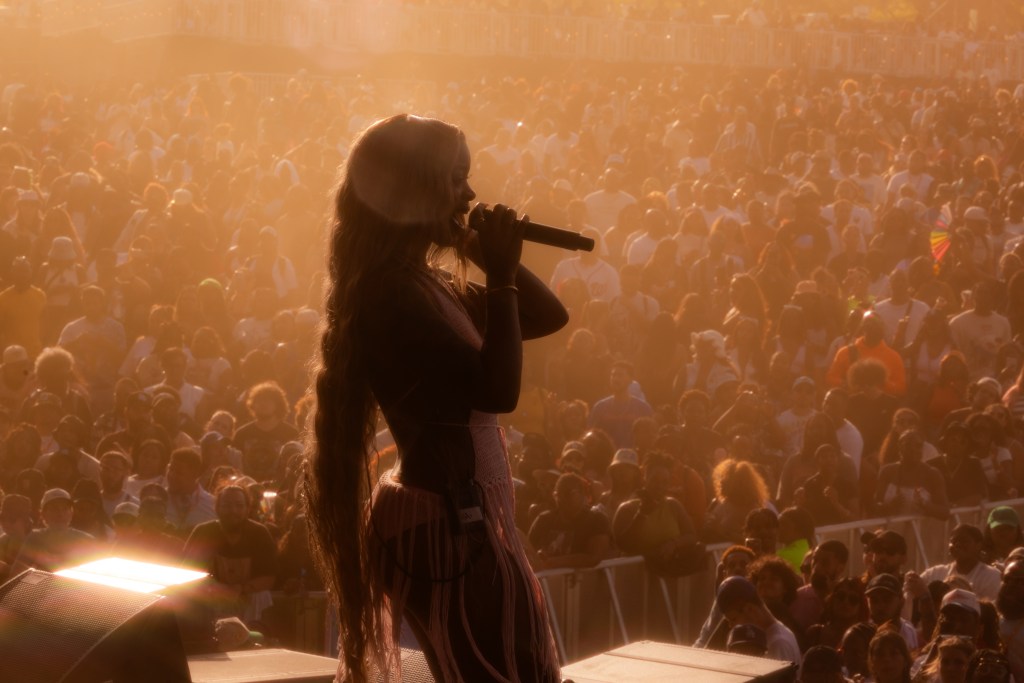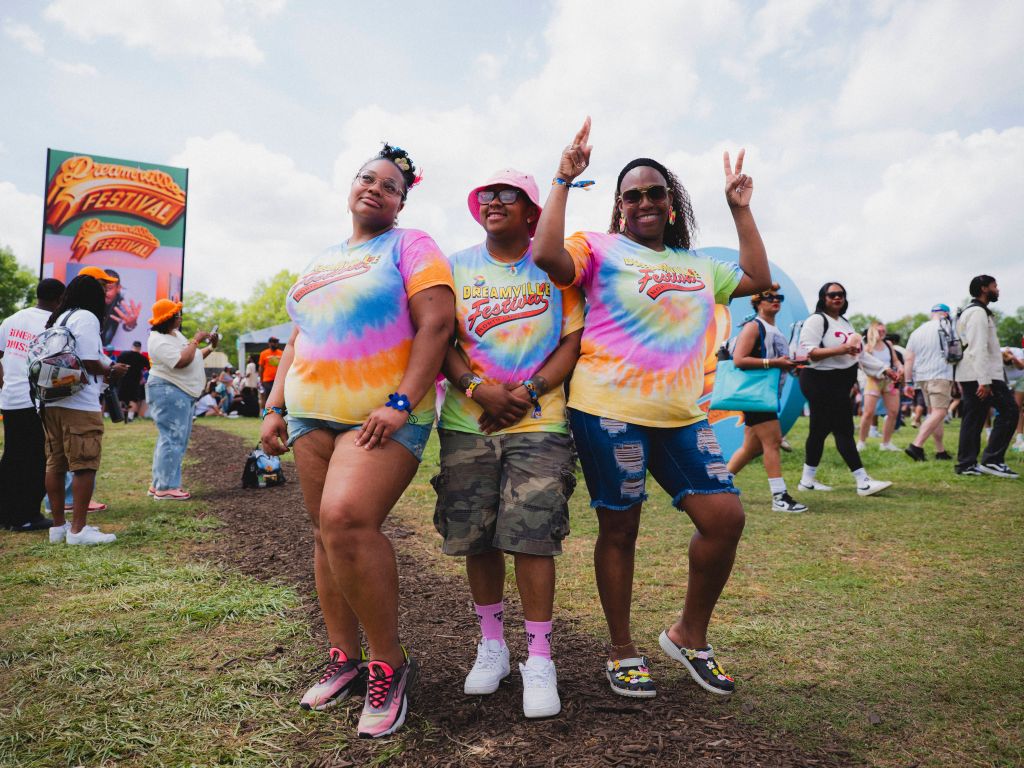An abridged list of things famously billed as final chapters that, ultimately, turned out not to be: Michael Jordan’s ’97-’98 season with the Chicago Bulls. Jay-Z’s 2003 The Black Album. And, as of last week, rapper J. Cole’s 2025 installment of Dreamville Fest, the multiday, blockbuster hip-hop event that first arrived in Raleigh in 2019.
Not unlike last year’s festival, which arrived just days after Cole’s brief (and ignominious) foray into the simmering Kendrick Lamar–Drake feud that would come to dominate the summer, this edition had its own air of intrigue: namely, the news that the 100,000-ticket extravaganza, promoted over the past year as the “fifth and final” festival, would be, well, not so final after all.
“We’re gonna continue on the same path that’s been successful for us,” Raleigh city manager Marchell Adams-David told reporters as part of the announcement, describing a new event that would definitely not be J. Cole’s annual April, Dix Park–based Dreamville Fest but would be held 1) in Dix Park, 2) around the same time every year, and 3) with involvement from J. Cole and his label, Dreamville Records. So far, organizers have been light on any further specifics about the yet-unnamed event, only offering that more details will be announced later this year.
“Our consumers have told us what they like,” Adams-David said, “and we’re gonna try to provide that for them for the next four years.”
One could be forgiven for wishing that beloved arts and cultural institutions not be spoken about in language that seems better-suited for a Fortune 500’s quarterly prospectus. And yet, on Dix Park’s sprawling grounds—kaleidoscopically adorned this year, as ever, with imaginative public art sculptures, a massive Ferris wheel, food and drink vendors from near and far, and two towering stages on opposing ends of the park—Adams-David’s basic premise was hard to challenge.
As in years past, conversations with attendees made it clear that the draw wasn’t so much specific names on the lineup as it was a general ambience—one that Dreamers find to be more communal, more calm (I’ve never seen so many adults blissfully napping in public in my life), and more inviting than other music festivals of its scale.
Late on Saturday, I spoke to two thirtysomethings from Vegas who said that even without J. Cole headlining, even without the Dreamville brand, they’d likely come back to future event iterations. Ditto for a trio of older Chicago millennials attending the fest for their third time, and a young woman from the Bay Area who in five Dreamvilles had never missed a single one.
Even when I finally did encounter defectors, it was hardly a commentary on the event itself: an artsy couple handing out free stickers ruefully told me this year would be their last, mostly because they wanted to become parents soon and felt the festival was part of a concluding chapter in their lives. It seemed that everywhere one looked, “the path that’s been successful for us” was plain to see.
But in at least one arena, organizers weren’t just continuing on the same path as much as charting a new one: operations and logistics, which reached a new level of sophistication this year. Everyone seemed to notice that things had never been so professionalized, from security to water supply stations, sound, and even the timeline of the day itself.
Consider the dizzying taxonomy of RFID wristbands (a chip technology often used for contactless exits and entries) on-site, of which I counted more than 10 types, but the true number could well exceed 20. At various checkpoints through the campus, access (to photo pits, VIP lounges, backstage, etc.) could be granted solely by the green- or red-emitting LED lights triggered by the bands—the freewheeling days of just being waved through by some figure of authority, or being granted certain privileges by association, were over.
At least, for the most part. On Sunday morning, riding along with an artist’s team as they entered the park—including a complete deboarding and reboarding of the vehicle for a K-9 search—I did make it into the artist village that sits behind the headlining stage. But once there, I was in wristband purgatory, with access to free Hennessy and hookah, and not much else.
Knowing that the next time I approached a checkpoint, a machine would glow red and I’d be booted out, I was tempted to stay. Still, after a few complimentary Henny-ritas, I sensed that the story was elsewhere and headed back to GA, relinquishing the first-class privileges that I never really had in the first place.

Most of the oddities and amusements of a spectacle like Dreamville aren’t to be found backstage, anyway. Exiting and reentering the grounds, I stopped to talk with a young man in Birkenstocks with flowing blond hair who was not on-site to attend the festival but rather to preach to the masses streaming into it. Unfortunately, most questions I asked him were reversed into questions about me, like whether or not I was right with Jesus (I confessed I was not).
On the other side of the park, a group of young girls no older than 13 regaled entrants with freestyles over old-school, “Rapper’s Delight”–style beats—I first saw them at two p.m., and they were still there doing it when I left at around 11, leaving me with no choice but to assume that these children were rapping for nine hours straight.
One might suspect that, for all the joys it provides to those inside its confines, the Dreamville circus might risk being a nuisance to those just outside it. As the crowd fanned out into the adjoining Boylan Heights neighborhood on Saturday night, I noticed a man on his porch who had set out a chair by the sidewalk with a sign reading “Hydrate!” alongside free bottles of water. Had the deluge of 100,000 people across two days become an undue burden on the residents? In five years, “we’ve never had a problem,” he said.

Maybe that shouldn’t be so surprising for a festival that has made a friendly sensibility core to its brand (some merch this year literally featured the phrase “Dreamville Family Reunion 2025”)—not just among customers but increasingly with the North Carolina hip-hop community itself.
To wander through the Fam or VIP areas was to constantly bump into a who’s who of local music figures, with some even ending up on the biggest stages: Cyanca and Shame Gang performing during Charlotte rapper Lute’s set; Jooselord and NLH Darian appearing as extras for Bas in front of 20,000-plus people. All the while, major North Carolina stars like TiaCorine and Vic Blends chatted and posed for photos with celebrities and fans alike, but mostly just hung out.
Technical achievements aside, the festival’s biggest feat every year may be this: the way that by the end of two days, it has reduced what would otherwise be remarkable in Raleigh to essentially background noise. Such things are just what happens at Dreamville.
Exiting the festival grounds with a group of friends and acquaintances on Sunday night, the friend driving our F-150 abruptly parked and got out when he saw an unassuming man in the post-fireworks quiet of the staff parking lot—forties, glasses, flat-brimmed cap—with the hood popped on his old school. Our friend embraced the man, chatted with him for a bit in a way that conveyed an easy familiarity, then popped back into the driver’s seat and told us who it was: J. Cole’s brother. Not part of an entourage, not hopping into a tinted-out SUV, just packing up his stuff and heading home, like this was the end of a youth soccer tournament.
Onstage just an hour before, amid a gauzy, finale-appropriate set that chronologically explored his 15-year career, Cole had once again invoked the familial, laid-back framing: “To me, this shit feels like a cookout, like a family reunion.” He wasn’t wrong. Sure, it’s a cookout where the T-shirts are $50, there are 20-plus levels of wristband-based citizenship, and the DJing doesn’t come from a wooden picnic bench but rather from a multistory liquor villa—but it’s a cookout nonetheless.
In managing to maintain that sense of authenticity and organicness alongside mainstream popularity, big-ticket corporate activations, and increasingly streamlined efficiency, the folks behind Dreamville have done something that even a hardened cynic would have to concede is pretty incredible.
It’s hardly a mystery why, Dreamville name on the banner or not, they aren’t ready to let the music stop. Not yet.
To comment on this story, email [email protected].
